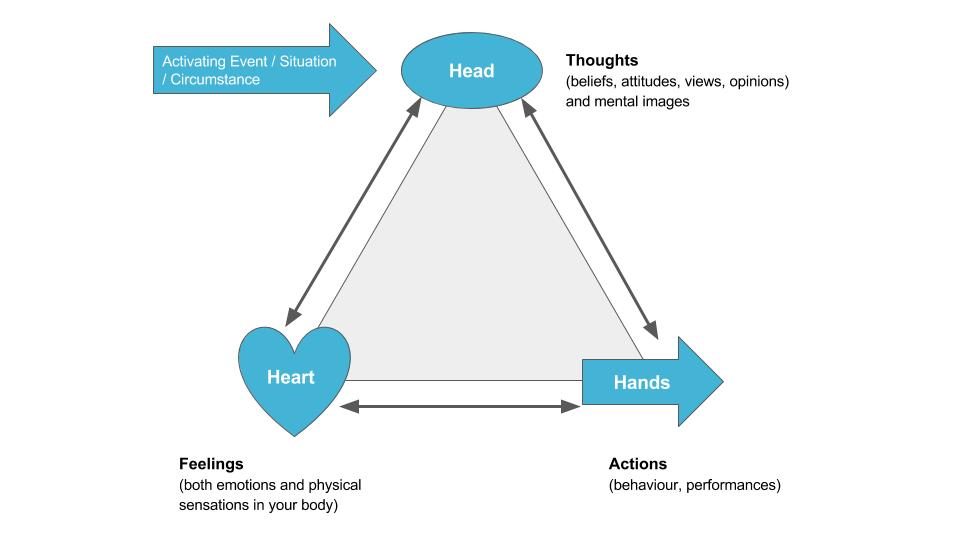What is Cognitive-Behavioural Therapy?
Cognitive-Behavioural Therapy (CBT) is a form of psychotherapy that helps you manage your problems by changing the way you think and behave. This is based on the idea that your thoughts about a certain situation can often affect how you feel both physically and emotionally and your thoughts, together with your feelings, can affect how you act in response. It can be illustrated like this:

Source: Claire Newton
Head is what we think. People’s beliefs, views and opinions about an event or situation.
Heart is how we feel. People’s emotions and the physical sensations in their bodies.
Hands is what we do. People’s behaviour and performance.
In other words…
- What you think
- Affects how you feel, which
- Influences your behaviour
So if you want to change your behaviour, you need to change your thinking.
How Does Negative Thinking Start?
Negative thinking patterns can start when we are very young children. For example, if you didn't receive much attention or praise from your parents or teachers at school, you might've thought "I'm useless”; “I'm not good enough"; “I am unlovable”. Over time, especially if the negative thinking goes unchallenged, you come to believe these assumptions, until these negative thoughts become automatic. This way of thinking might then affect how you feel and react at work, university or in your general life going forward right into adulthood and old age.
Transactional Analysis refers to these automatic thoughts as our Life Script. Please read my article ‘Transactional Analysis – Part III (The Scripts We Follow)’ for more information about how our life scripts influence our behaviour.
Cognitive Distortions
Cognitive distortions reinforce negative thinking or emotions and are ways we tell ourselves things that sound rational and accurate, but really only serve to keep us feeling bad about ourselves. For example, a person might tell themselves, “I failed when I tried to do something new; I will therefore fail at everything I try.”
To find out whether YOU use cognitive distortions please read: "Change Your Thinking… Change Your Life!”
How do we Identify and Stop Negative Thinking?
Most of the time we do not even notice our negative thoughts because they flash quickly through our mind, seem believable and become a habit. All habits become automatic; we do them without even noticing that we are doing them. It is the same with negative thinking, so if we want to stop negative thinking, we have to first notice it by monitoring our thoughts. Once we have become aware of them, we can then challenge them.
Monitoring Negative Thoughts
The best way to monitor your thoughts is to keep a form of ‘diary’ in which you record what you are doing, what your thoughts are and how you are feeling.
For example:
| Activating Event |
Thoughts and Images |
Feelings |
Behaviour |
| (What is happening) |
(What I am thinking) |
(What I am feeling – emotions and physical sensations) |
(What I am doing) |
| My friend hasn’t invited me to the party, even though she said she would |
She doesn’t want to be seen with me |
Hurt and angry / Stomach churning |
Withdraw and never contact her again |
(You can find a full copy of this worksheet on my website.)
This may not be as easy as it appears. Remember that your thoughts are automatic and so it is often quite difficult to even ‘hear’ them. Feelings are also not easy to identify. The more blocked you are from deep, underlying feelings, the harder it will be to identify them accurately. Working with a therapist will make the process easier for you in the beginning, until with practice you can do it accurately on your own.
You can find a list of feeling/emotion words on my website to help you identify your feelings more accurately and precisely.
Challenging Negative Thoughts
Once you are aware of your thoughts and feelings and the negative effect they are having on you, you can start to change them. This process of change begins with challenging your thoughts. In other words, assessing how accurate they are. Challenging your negative thoughts requires you to answer many questions, for example:
- Are there alternative ways of looking at the situation?
- Is my thinking distorted?
- Will my thinking best help me protect my life and health?
- Will my thinking best help me to feel the emotions I want to feel?
You can find a poster of these questions on my website titled ‘Challenging Negative Thoughts’. Please use it to help you challenge your negative thinking.
Changing Negative Thoughts
Once you have started noticing your negative thoughts, monitored them to see how they affect your mood and challenged their accuracy, you can start to change the way you think on a daily basis resulting in a more positive outlook on life.
The ‘Self-Monitoring Chart’ will help you to do this.
A word of caution:
Changing your thinking is not a solution for all cases of mental disorder. It only works in some cases – when the mental disorder is caused by faulty thinking. If the cause of the mental disorder is biological, then CBT is not going to help.
For example, if an individual’s depression is caused by a chemical imbalance (biological cause), then changing your thinking is not going to help. The person needs to address the chemical imbalance with medication, diet and exercise. For more information about the causes of mental disorders please read “Understanding Mental Disorders”. For more information about depression, its causes and treatment please read “Defeating Depression”
What do YOU Think?
Share your wisdom with others… Have YOU ever had Cognitive Behavioural Therapy? What was your experience of it?
Leave your comments here.
|






